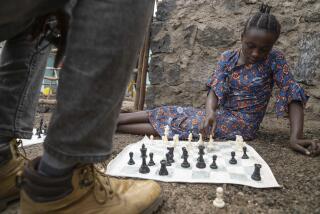Change of Leader Means Little in Village
- Share via
SHABUNDA, Congo — Greeting the new day, the clanging bell of Shabunda’s mission church pierces through the sounds of crickets and birds, as it has for decades.
Slowly, voices mingle with the still cool morning air, and the broad dirt boulevards, packed down by passing feet, are peopled for another day.
Women in brightly patterned wrappers and headdresses march in ones and twos down a narrow footpath to the running taps at the stream. They greet friends coming back with yellow cans brimming with water strapped to their heads.
It is hard to believe life was ever any different here--or that President Laurent Kabila’s rebel war, which swept violently across eastern Congo’s vast rain forest earlier this year, came right through this remote jungle village of 15,000 people.
Here, just as before the war, the people are poor farmers who subsist mainly on cassava and barter for what little they have or need. Nearby gold mines could just as well be on the other side of the universe.
Roads, built by Belgian colonists through the dense forest, deteriorated to impassable under the neglectful 32-year regime of ousted President Mobutu Sese Seko. Residents have to walk for days to reach Bukavu, the nearest city, 105 miles to the east.
But the poverty in these parts may have been a blessing. Mobutu’s unpaid, unruly troops did not bother to loot in Shabunda as they did in other places. There was nothing worth taking.
Still, people had hoped Kabila’s new government would bring change. Many say they are disappointed.
“Current, current,” several people shouted at two journalists walking through their quiet village at twilight. They wanted electricity, something this village has not seen since the time of the Belgians, who granted independence to Africa’s third-largest nation in 1960.
“We welcome the possible change,” said Jim Lindquist, an American missionary in Katshungu, a village 25 miles north of Shabunda. “But so far the people have been disappointed. They are hoping, but they have seen no change yet.”
It is a sentiment echoed again and again by villagers and residents of the larger cities in eastern Zaire. They fear Kabila has forgotten them since reaching the national capital, Kinshasa, about 745 miles to the west.
Many children have the wispy, orange hair and distended bellies that are signs of kwashiorkor--the disease of the malnourished. Still, the shoeless youngsters run happily along the dirt roads and scurry among the trees that bring the forest into the village.
Few take notice of the Rwandan Hutu refugees who wander down the roads to the office that the humanitarian group Save the Children recently set up. One agency official says the refugees are trickling in from the forests at a rate of about 25 a day. They wait around for food and blankets--and possible news of the loved ones they lost along the way.
Some join in one of the three services held Sunday mornings at the mission church, filling the village with upbeat harmonies.
Refugees and other witnesses have told journalists of Hutus being massacred by Kabila’s troops during the war, including accounts of thousands being attacked at a bridge just north of Shabunda.
Kabila’s government denies the charges. And as the war’s memories give way to the daily struggle to survive, the stories seem as remote as the isolated jungle village.
During the weighty midday heat, the refugees are the few people out, sitting under the pergolas or on the grass near the Save the Children office. Most villagers take refuge in the cool interiors of their mud huts.
The roar of a security motorcycle is the only thing to break the lazy quiet of midday.
“Carl Lewis,” as the security officer is known, is out and about on his brand new bright red four-wheeled tractor bike, letting residents and their journalist visitors know that the security apparatus of Kabila’s Alliance of Democratic Forces for the Liberation of Congo is in place here too.
“We are here for your security,” he tells the journalists several times, meaning he wants to keep them in sight.
Carl Lewis’ bike, another red security bike and an aid agency pickup are the only vehicles in Shabunda.
When the sun begins to drift behind the surrounding forest, young men venture out to play volleyball. The women head to the water taps to fill their yellow cans again.
As afternoon turns to twilight and then dusk, the vast African sky takes on a rich, dark glow, and chattering voices compete with the sounds of crickets and frogs in the cooling air.
In the village center, a few small shops selling household goods remain open. A tailor sits outside with his sewing machine, mending a tear by the glow of a kerosene lamp. Rhythmic soukouss music plays on a tape deck.
Slowly the voices settle, and the sounds of the forest take over the night and Shabunda.
More to Read
Sign up for Essential California
The most important California stories and recommendations in your inbox every morning.
You may occasionally receive promotional content from the Los Angeles Times.










